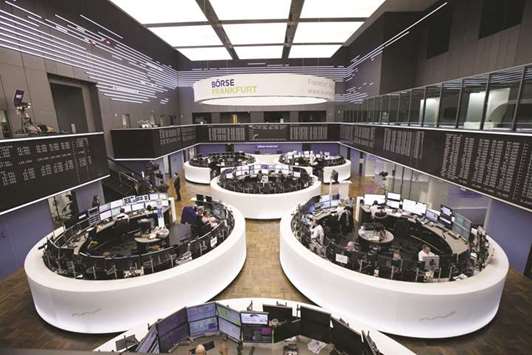Global stock markets fell yesterday on escalating trade tensions between the United States and other world powers.
A day before the European Union was to slap retaliatory tariffs on a range of American benchmark products, including jeans and motorbikes, analysts said trade war fears were quickly turning into the real thing.
London’s FTSE 100 closed 0.9% down at 7,556.44 points, Frankfurt’s DAX 30 ended 1.4% down at 12,511.91 points and Paris’ CAC 40 lost 1.1% at 5,316.01 points, while the EURO STOXX 50 ended 1.1% down at 3,403.51 points yesterday.
“We have a trade war — and it’s an escalating trade war,” SEB chief economist Robert Bergqvist told AFP in an interview.
The US’s apparent readiness to introduce tariffs on all imported Chinese goods made this “a serious situation”, he said.
By announcing tariffs on $50bn in Chinese imports and threatening tariffs on up to $400bn more, US President Donald Trump is testing a no-holds-barred strategy whose consequences remain unknown.
China accounts for about half of the massive US trade deficit in goods, leaving the Asian powerhouse far more exposed to Trump’s tariffs than vice versa.
Last year, the United States exported $130bn in goods to China but imported $505bn.
At the same time, Brussels will implement today a raft of retaliatory tariffs against metals duties imposed by Trump on Europe and others.
Bergqvist argued that his “main concern” over a trade war was the impact on stock markets — and the subsequent knock-on effect for the world economy.
“Investors... are more cautious today, they are waiting for the right time to reduce their exposure in stock markets,” he said.
“All these kind of things going on right now could trigger that kind of behaviour and initiate a correction in the stock markets, and that could also trigger a slowdown in the global economy.”
In the foreign exchange market, the pound got a shot in the arm after analysts said that the main takeaway from yesterday’s Bank of England monetary policy announcement was that rates would rise in August.
“The pound has been given a significant boost by the Bank of England” said Craig Erlam at Oanda.
The rise in the British currency in turn weighed on London’s FTSE index which is home to major exporters who will suffer from a strong pound.
Oil prices, meanwhile, dropped sharply on the eve of an output decision from the Organization of the Petroleum Exporting Countries (Opec), the 14-nation cartel that pumps 40% of global crude.
Expectations are growing that Opec will raise its collective production ceiling.
Iran’s oil minister said his country was “ready for a deal” ahead of the meeting.

Traders monitor financial data inside the Frankfurt Stock Exchange. The DAX 30 ended 1.4% down at 12,511.91 points yesterday.
